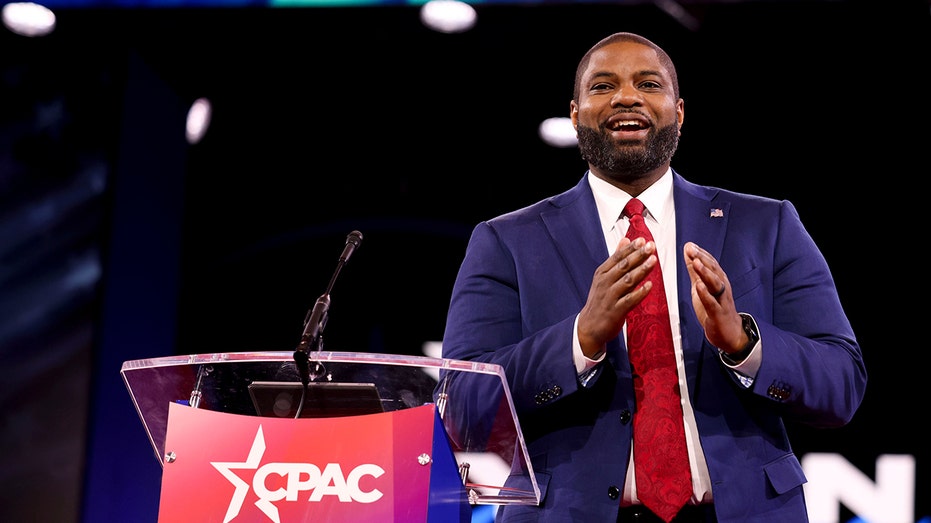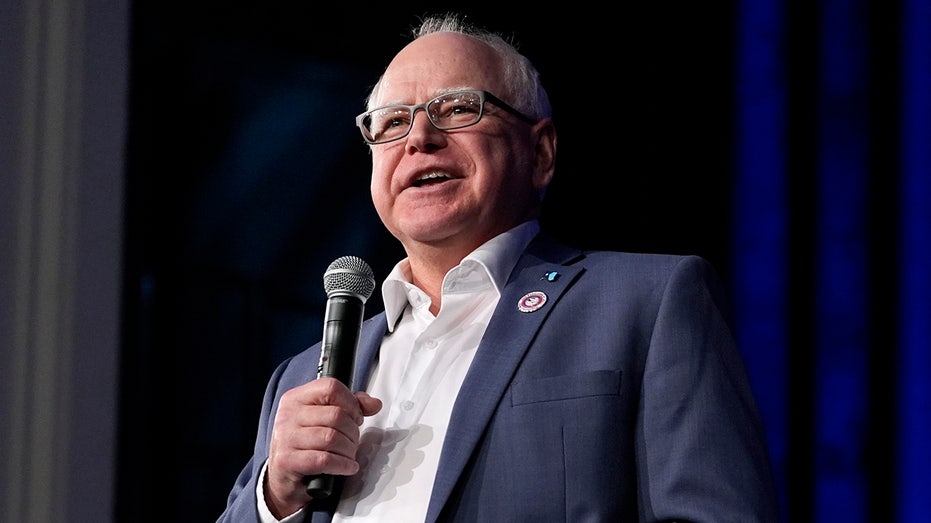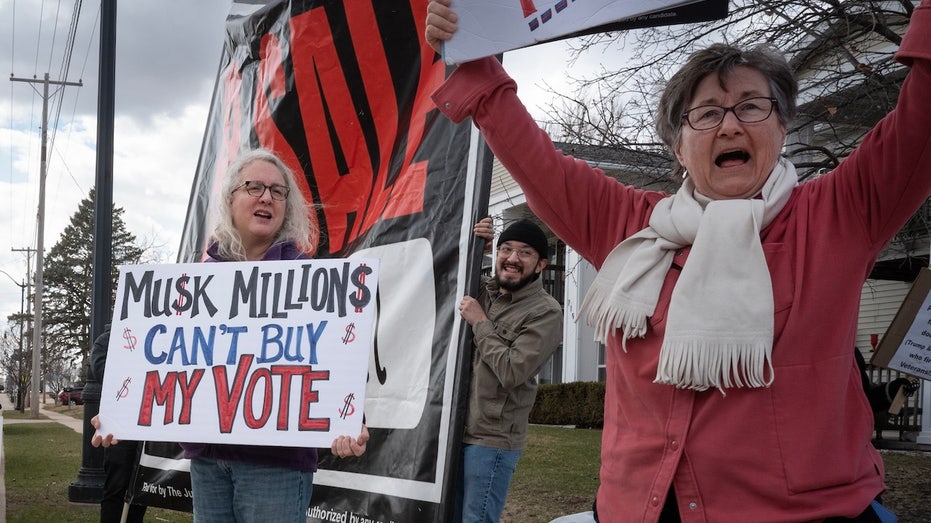‘Show of force’: Trump ally kicking off campaign in race to succeed Florida Gov DeSantis

GOP Rep. Byron Donalds formally launches his campaign for Florida governor on Friday with what is being billed as a hometown kickoff rally. The conservative lawmaker, who has represented Florida’s 19th Congressional District in the southwest part of the state for four years, is currently the only major Republican to jump into the 2026 race to succeed term-limited GOP Gov. Ron DeSantis. Donalds, a staunch supporter and ally of President Donald Trump, announced his candidacy during an appearance on Fox News’ “Hannity” late last month, days after landing the president’s endorsement. Additionally, two MAGA world rock-stars – Donald Trump Jr., the president’s eldest son, and Charlie Kirk, the conservative activist and commentator who leads the powerful Turning Point USA youth organization – have recorded videos for Donalds’ campaign kick-off, sources tell Fox News. Conservative commentator Benny Johnson will speak in person at the event. FIRST ON FOX: LEADING CONSERVATIVE GROUP BACKS DONALDS IN FLORIDA The campaign event, in Bonita Springs, comes as Florida first lady Casey DeSantis has acknowledged she is considering a 2026 gubernatorial run to succeed her husband in Tallahassee. “I think what you’ll see is a show of force and I think the support and the momentum that Bryon is generating across the state, whether it’s fundraising or grassroots support, will be evident,” veteran Republican strategist and Florida native Stephen Lawson told Fox News. WHAT BYRON DONALDS TOLD FOX NEWS’ LARA TRUMP Lawson – who served as an adviser to DeSantis as well as his predecessor in Tallahassee, former governor and current Sen. Rick Scott – emphasized that “with President Trump’s backing, Donalds is the person to beat in this race.” DeSantis has repeatedly touted his wife’s accomplishments as Florida first lady and framed her as a worthy successor. Additionally, Casey DeSantis, late last month, stoked speculation when asked by reporters if she would run. “To quote the late Yogi Berra,” DeSantis said as she reiterated a famous line from the late baseball legend. “If you see a fork in the road, take it.” The governor then quipped to reporters that “you guys can read into that what you will.” RON AND CASEY DESANTIS TEE OFF WITH TRUMP AS FLORIDA GOVERNOR’S RACE HEATS UP When asked this month at the National Review Institute’s Ideas Summit in National Harbor, Maryland, if she might launch a campaign, Casey DeSantis said “we’ll see.” Sources last month confirmed to Fox News that the governor has been reaching out to donors on behalf of his wife. The next campaign cash filing deadline in the Florida governor’s race comes at the end of this weekend, and a source in the congressman’s political orbit predicted to Fox News that Donalds would “easily eclipse” the $1 million DeSantis raised in his first month as a gubernatorial candidate in his successful 2018 campaign to succeed Scott as governor. “I think he’s going to show a really strong fundraising number,” added another Florida-based Republican strategist, who asked to remain anonymous to speak more freely. Donalds has been complimentary of Gov. DeSantis. “We have a great governor,”Donalds said last month in his “Hannity” interview. “Ron DeSantis has done a tremendous job for our state. But now the job is to keep the best state in the country as the best state in the country. And so that’s going to be the mission at hand.” A GOP strategist who has long worked on Florida races said he thinks Donalds “has been really careful to be kumbaya with the governor and Casey. I think you’ve seen that from his messaging… He wants to build on the conservative record of success in Florida while also forging his own path.” However, the source added that Donalds will use Friday’s campaign kickoff to “put a marker down to show that this is his race to win.” An internal poll conducted earlier this month for Donalds’ campaign indicated the congressman edging Casey DeSantis by single digits in a hypothetical GOP primary showdown. However, the survey suggested that Donalds’ lead surged to more than 20 points when respondents were informed that he is supported by Trump, whose sway over the GOP is stronger than ever. Florida used to be the nation’s top general election battleground state, but it has dramatically swung to the right in the past couple of election cycles. DeSantis won his 2022 re-election by nearly 20 points, and Trump carried the state last November by 13 points. With Florida now clearly a red state, the winner of the Republican gubernatorial primary will be considered the favorite in next year’s general election.
Massive fire at girls’ hostel in Greater Noida, video shows two students attempting to jump out of balcony, WATCH

A massive fire broke out at a girls’ hostel in Greater Noida on Thursday evening, i.e., March 28. A video of the incident is widely being circulated online, featuring two girls attempting to jump out of the balcony.
Protest against Waqf Bill: AIMPLB appeals to Muslims to wear black arm bands while offering Namaz on Alvida Jumma

The All India Muslim Personal Law Board’s (AIMPLB) call to Muslims to wear black arm bands as a mark of protest against the Waqf (Amendment) Bill while offering namaz on the occasion of Alvida Jumma drew significant response.
Rise of Flexible Workspaces: Know why more professionals are choosing co-working in Singapore

The growing popularity of co-working spaces in Singapore highlights a fundamental change in how professionals and businesses approach the concept of work. With their flexibility, cost-effectiveness & collaborative environments, co-working spaces offer an appealing alternative to traditional office.
India’s one of the best online courses for Stock Market

Knowledge, experience and patience is the Key to Success in the Stock Market
How resilience and data science transformed Sheetal Vadaga’s life?

Sheetal Vadaga’s journey is a testament to resilience, as she rebuilt her career in Data Science after personal tragedies, inspiring others through mentorship and perseverance. Her story highlights the power of education and determination in overcoming life’s setbacks.
India’s most trusted organic beauty brand, Soulflower, continues its reign as an Amazon bestseller

India, March 27, 2025: In an industry dominated by chemical-laden hair care products, Soulflower has emerged as a disruptor & category creator of Rosemary for Hair Growth in India. Today, the clinically proven, organic, 100% natural and cruelty-free Soulflower Rosemary Range, including Rosemary Essential Oil, Rosemary Redensyl Hair Growth Serum, and Rosemary Mint Hair Spra,y secure Amazon’s best-seller categories.
Walz says Dems weren’t ‘bold enough’ to double down on DEI, immigration

Minnesota Gov. Tim Walz said the Democratic Party has gotten into its current mess because it wasn’t “bold enough” to stand up for diversity, equity and inclusion and immigration. The former vice-presidential candidate appeared Thursday at a town hall event in Rosenberg, Texas, alongside former Rep. Beto O’Rourke. He told supporters “I’m just going to note this s— show of a [Signal] text chain that was going on could have used a little diversity, equity, inclusion in the people who were there.” “So I think and I’m going to own this, when we see people back off and we see corporations back off to the threats, instead of leaning into and knowing we’re doing this because it’s not only morally the right thing to do, it’s economically the right thing to do. And our culture proves that our strength is our diversity,” Walz continued. “We’ve been talking about this for years as a country of immigrants, and we let them define the issue on immigration. We let them define the issue on DEI, and we let them define what woke is,” Walz declared. “We got ourselves in this mess because we weren’t bold enough to stand up and say ‘you damn right we’re proud of these policies. We’re going to put them in, and we’re going to execute them.’” TRUMP RIPS ‘LOSER’ TIM WALZ FOR HURTING DEMS IN 2024 ELECTION Walz added that Republicans are “going to use fear” and “they’re going to do whatever they can. “What I would say is we need to make sure we’re highly organized,” he told the audience. “One of the groups that has benefited greatly by us understanding that diversity, equity and inclusion and having policies around that, were veterans themselves for hiring. Veterans are a part of the group when the federal government hires people based on that,” Walz also said. “The rest of it is, as we all know, in Minnesota, pretty white, pretty cold, much like you see in the Northern hemisphere, northern states, population going down, 70% of our workforce over the next 20 years is going to come from communities of color,” he added. “Our very existence depends on diversity, equity and inclusion.” TIM WALZ SAYS HE WAS JOKING WHEN HE MOCKED TESLA’S FALLING STOCK Last week, Trump said Walz contributed to the Democrats’ loss in the 2024 election. Trump’s comments came in response to statements Walz provided in a podcast with California Gov. Gavin Newsom, in which Walz predicted he could kick the “a–” of most Trump supporters. “Well, he’s a loser. Yeah. No, I think so. He lost an election,” Trump said. “He played a part. You know, usually a vice president doesn’t play a part. They say. I think Tim played a part. I think he was so bad that he hurt her. But she hurt herself. And Joe hurt them both. They didn’t have a great group, but I would probably put him at the bottom of the group.” Fox News’ Diana Stacey contributed to this report.
Elon Musk becomes DNC’s target in high-stakes Wisconsin Supreme Court showdown

The Democratic National Committee (DNC) launched its first-ever ad buy Friday targeting Elon Musk and the millions of dollars he has injected into the Wisconsin Supreme Court race, previewing what could be a broader strategy for the party going forward. The DNC ad buys, which are slated to run through Tuesday in seven local newspapers across Wisconsin, take aim at the $19 million Musk and his affiliated PACs have spent on behalf of conservative candidate, Brad Schimel, in a high-stakes state Supreme Court election that will determine whether the court retains its current 4-3 liberal majority. Musk “has threatened Medicare, gutted Social Security services, and now he thinks he can buy himself a seat on the Wisconsin Supreme Court,” DNC Chair Ken Martin said in a statement Friday. “That’s why, today, the DNC is out with our first paid media explicitly calling out Musk for his attempts to meddle in Wisconsin’s elections.” JUDGES V TRUMP: HERE ARE THE KEY COURT BATTLES HALTING THE WHITE HOUSE AGENDA DNC officials told Fox News Digital that the ads will run in seven local newspapers across the state – the Chippewa Herald, the Manitowoc Herald Times Reporter, the Beloit Daily News, the Daily Jefferson County Union, the Janesville Gazette, the Watertown Daily Times and the Oshkosh Northwestern – and highlight the message, “Wisconsin is not for sale.” “Wisconsinites deserve a Supreme Court justice who looks out for them, not the ultra-wealthy,” Martin said. “Now and forever, Wisconsin is not for sale.” The closely-watched state Supreme Court in Wisconsin is already the most expensive judicial election in U.S. history, reaching a total of more than $81 million in spending and far eclipsing the $56 million spent on the state Supreme Court race just two years earlier, according to figures compiled by the Brennan Center for Justice. Musk’s two super PACs spent more than $17 million on Schimel’s behalf, while Musk personally donated $3 million to the Wisconsin Republican Party earlier this year – funds that in turn can be used for Schimel’s campaign. President Donald Trump and Musk have thrown their weight behind conservative candidate Schimel, with Trump himself stumping for Schimel during a Thursday evening tele-town hall event and billing the race as one that could have an “outsized impact on the future of the country.” “I know you feel it’s local, but it’s not,” Trump said, adding, “The whole country is watching.” Meanwhile, former President Barack Obama and other notable Democrats have thrown their weight behind liberal opponent Susan Crawford, the current Dane County circuit judge whose campaign has attracted more than $25 million in funding ahead of the race. AFTER STINGING ELECTION DEFEATS, DNC EYES RURAL VOTERS AS KEY TO 2026 MIDTERM SUCCESS Democrats, for their part, see the race as fertile proving grounds to test their attack against Musk as they look to retain a critical state Supreme Court seat in Wisconsin and gear up for the 2026 midterm elections. The efficacy of the ad campaign in Wisconsin, a that narrowly elected Trump in both the 2016 and 2024 presidential contests, remains to be seen. However, it comes as Democrats have struggled to coalesce around a unifying message in the aftermath of the 2024 elections, which could make Musk, and his Department of Government Efficiency (DOGE), more attractive targets. Polling numbers in Wisconsin also bear this out. Fifty-three percent of Wisconsin voters said earlier this month that DOGE is disrupting programs required by law, according to a survey from Marquette University Law School, while a slightly lower 47% said the quasi-agency is carrying out Trump’s agenda. A larger 59% majority said Trump’s freezing spending and his closing of federal agencies is beyond his governmental authority.
After years of disappointment at the polls, Texas Democrats will select new party leader

The State Democratic Executive Committee will meet on Saturday to elect the successor to party Chair Gilberto Hinojosa.
